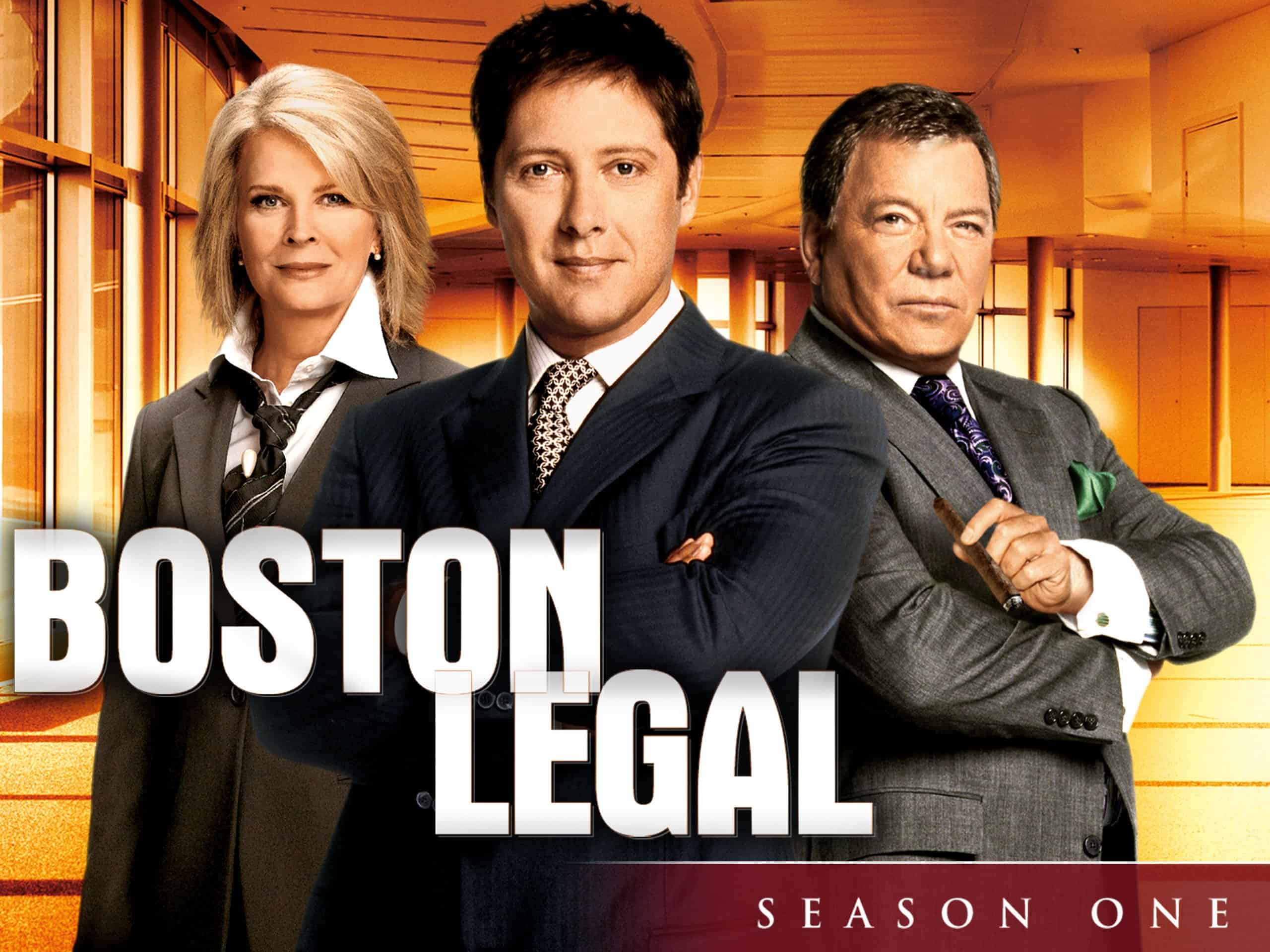I love stories based on law. I watch and re-watch Anatomy of a Murder, 12 Angry Men, The Rainmaker, The Firm, To Kill A Mockingbird and I read John Grisham voraciously. For the same reason, I watched Suits and Boston Legal.
Unfortunately, comparing these two is not unlike comparing Chicken McNuggets, French Fries and Coke to a four course meal of Pappa al Pomodoro, Potato Gnocchi, Pesto Genovese, Meatloaf – Polpettone, and Tiramisu with a bottle or two of Brunello di Montalcino or Bolgheri Rosso.
You get the picture?
Boston Legal is a comedy-drama, so there is always an undercurrent of cynicism/sarcasm running. The plot takes place in Crane, Poole and Schmidt, a law firm in Boston. Crane is Denny Crane (William Shatner) and Schmidt is Shirley Schmidt (Candice Bergen). But the lead role along with Shatner is Alan Shore played by James Spader.
The two lead characters carry most of the show, ably supported by other cast members. William Shatner as Denny Crane is just brilliant. It is very difficult for an actor who has been successful in a role to cast off the old character and reinvent himself. This is much more difficult in television than in movies because of the long exposure of the former. Denny Crane is poles apart from James T. Kirk of Star Trek. Denny has allegedly never lost a case and is therefore a legend. He is an egotistical skirt-chaser who also happens to be a red hot republican and a staunch defender of guns. When forced by the state to represent a man who has raped and murdered a thirteen year old girl, he shoots his client in both knees to get out of the case. He often contradicts himself and either does not realise it or does not care. For instance, “Let me tell you something, I came here to enjoy nature, don’t talk to me about environment.” He also has early signs of Alzheimer’s or it could be Mad Cow disease, the doctors are not sure. He likes to say his name to everyone, including the judges, “Denny Crane.”
Alan Shore is opposite of Denny Crane in many ways. Alan is a democrat and somewhat of an idealist who often takes a stance that goes against the majority. He also has memorable lines like, “Sincerity, Sally, once you learn to fake that, there will be no stopping you.” Some of the closing statements by Alan Shore are truly remarkable.
The dynamic of these two characters is unique. Both are excellent lawyers. They are best friends. One gets the feeling that the writer may have kept in mind a dynamic similar to what James Kirk had with Spock in Star Trek, which, in turn, may have been inspired by Sherlock Holmes and Dr Watson. They also have an unspoken policy similar to ‘No hugging, no learning’ motto in Seinfeld. In one of the episodes, Alan breaks up with his girlfriend. When Denny says he is sorry, Alan says that he does not hurt. Denny says, “So I don’t have to hug you and tell you I’m there for you and all that crap?” “We can skip it.” (This is also a reason why I cannot watch more than 5 mins of Friends.)
Even though it’s a comedy, the plot and subject matter are anything but. In almost every episode, there are two cases that often tackle mindbogglingly complex legal issues. A suspect with prior convictions gets injured in a shooting near the area where at the same time a robbery has taken place. The only evidence state has is the bullet which now resides in the suspect’s chest. He refuses operation and the state charges him for withholding the evidence. Does he have a legal right to refuse the operation? Or a husband suing his divorced wife to release their son’s frozen umbilical chord to treat his leukemia. She is refusing it but there is another reason for that. The child is not his! What should a lawyer do? Tell his client the truth and add to his suffering or continue with the case on a false premise? As it turns out, the lawyer finds a third way out. Or a doctor who does not prescribe morning-after pill to a rape victim because Catholic affiliated hospitals in Massachusetts are not required by law to do that. The victim gets pregnant and sues the hospital. Boston Legal featured an episode based on the illegal detention and torture of innocent people held at Guantanamo Bay in 2006, something that even Hollywood has not managed so far. And which other TV series has dared to tackle the pinnacle of legal complexity, the Roe v. Wade decision?1
What about lawyers who represent the guilty parties? Are they all bad? While Boston Legal does have many cases where the lawyers represent the victims, it also shows cases where the clients are clearly guilty. What kind of moral dilemmas do the lawyers face in such cases? The series shows a range of reactions from the lawyers when they represent guilty parties. Sometimes, they don’t care and just do it for the money. Other times, after they get their client acquitted, they wonder if they have done irreparable harm to society. And in one case, where a woman suspected of killing her rich husband walks free, Denny and Alan wonder if she really killed him or not. Our films and television have been very one sided in showing only the lawyers taking on morally justifiable cases. Boston Legal attempts to shift the balance.
As the attorneys were making closing statements in each episode, Boston Legal often made me feel as if I was one of the jurors, which perhaps was the intention of the makers. Many times, I found myself getting convinced by both the plaintiff and the defendant. It also made me realise that justice is not automatic and often depends on human factors that are difficult to predict and control. As Shirley Schmidt says in one of the episodes,
You can take all the facts of a case, figure in all the lawyers, extenuating circumstances and still people forget in the end it all really comes down to the judge.
And so we come to Suits. I saw it just before Boston Legal and I think it has taken some inspiration from it because Suits also features two male lawyers in leading roles (and on posters), Harvey Specter (Gabriel Macht) and Michael Ross (Patrick J. Adams). The series starts with a dramatic encounter between the two. Mike, who is not a lawyer but has a memory like that of Will Hunting from Good Will Hunting, bluffs his way in the interview with Harvey and gets hired as a lawyer. Next few seasons are spent between Mike trying to keep his secret, office politics within the firm with people trying to become partners, senior partners, name partners or managing partners as the case may be, affairs between various interested parties and last and the least, trying to win some cases for clients.
Unlike Boston Legal, Suits tries to avoid scenes inside of a courtroom as far as possible. From day 1, we are told about what a killer lawyer Harvey Specter is, but we rarely see him in action, either in interrogations or delivering closing statements. One activity that everyone in Suits is doing ALL THE TIME is : walking. They are always walking into each other’s rooms to deliver one liners or monologues or get into shouting matches. Sometimes, they go across town to say just one line to someone and come back. Makes you wonder if these guys are aware of phone, text, WhatsApp, Signal, Telegram, Zoom, FaceTime etc.
Other popular activity in the series in lying. Everyone is lying to everyone else most of the time. Sometimes, you can sense that the character is lying just to create complications so that the plot can advance.
There’s not much to add except that in all subsequent episodes of Suits, these activities are repeated.
- As it happens, the US Supreme Court just overturned Roe v. Wade. I wonder what Alan Shore would have to say about that. ↩︎



